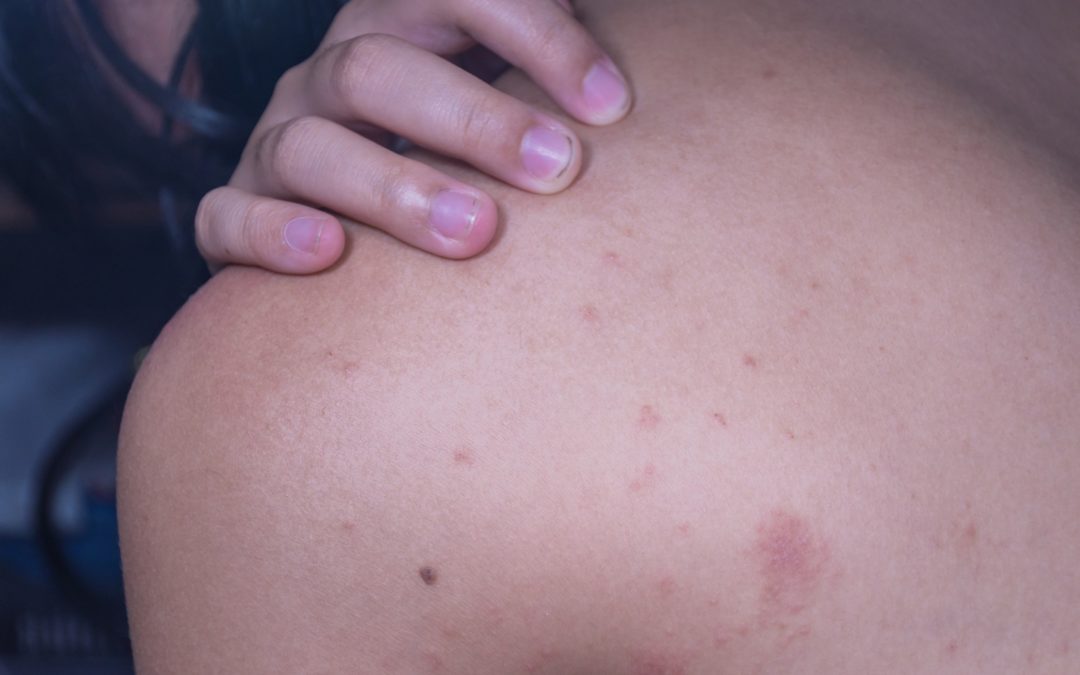What is Eczema?
Eczema is a skin condition that manifests as red, inflamed patches of skin that can be itchy, cracked, and rough. Over 30% of Americans suffer from eczema in various types and at different times in their lives. The most common type of eczema is atopic dermatitis, making the two terms nearly synonymous to most.
The term “atopic” is inclusive of many diseases that involve the immune system and include inflammation, such as hay fever and asthma. The word dermatitis refers to an inflammation of the skin. Eczema is often seen in infants, and while many outgrow the condition, others will continue to have eczema outbreaks throughout their adulthood. Although symptoms vary depending on age, there are often itchy, scaly patches of skin present.
Although certain foods and environmental situations can trigger eczema, it is not curable – so removing the offending trigger may help but will not eliminate the condition. Nuts and dairy are common eczema triggers, as are smoke and pollen. Because eczema is not a curable condition, the focus is on treatment and management.
What is CBD?
The cannabis plant produces more than 400 different compounds, some of which occur in many other types of plants. Over 60 of them, however, are specific to the cannabis plant and are known as cannabinoids. One of these compounds – CBD – holds promise in regards to a broad spectrum of medicinal and therapeutic benefits.
Perhaps the most essential quality of CBD to point out is that it is not intoxicating. meaning it won’t get you “high” or “stoned”, both of which are due to a different cannabinoid in the marijuana plant known as THC. This inert quality makes all the difference from a legal perspective. Cannabis without THC is known as hemp, and hemp products are legal in virtually every state. It is the THC which is in legal question. In states where medical cannabis is not permitted, all CBD products are derived from hemp. In the state of Florida, where medical marijuana is legal, CBD products can be freely obtained.
CBD to Treat Skin Inflammation
As is the case with all CBD and marijuana, meaningful research is only now making it to the mainstream.
Eczema is typically treated by managing the most conspicuous or prevalent symptoms to avoid major flare-ups. The most visible symptom is patches of dry, blotchy skin, often on the neck, face, torso, and extremities. Although it may appear to be contagious, it is not – but very different from person to person, making treatment just as variable. The most common strategies to living with eczema include frequent moisturizing, warm baths, utilizing less stringent soaps, and even choosing cotton clothes that will not irritate the condition further.
CBD has been garnering attention in the beauty industry, with claims of anti-aging and anti-wrinkle capabilities. There is a lack of scientific evidence and research to back up those claims. However, studies prove CBD is useful as an anti-inflammatory, and it also has antioxidant properties. Both of these qualities may help to prevent infections of the skin when weakened by eczema.
The evidence that CBD works to manage eczema symptoms is still anecdotal and requires more medical research. Still, with all we are learning about the healing effects of both CBD and medical cannabis, it is not hard to imagine a day when the hemp and cannabis plants become among essential sources of medication and treatment.
In our clinic we have had success using topical agents for eczema. For example a 1:1 (equal amounts of CBD and THC) topical suave, applied twice daily to affected skin areas has often helped reduce itching and hypersensitivity in patient’s with eczema.
If you suffer from a chronic condition and want to learn more about how medical cannabis can benefit your health, call Neurology of Cannabis in Sarasota. Dr. Daniel P. Stein and his staff are here to help you on your journey towards better health and well-being.

